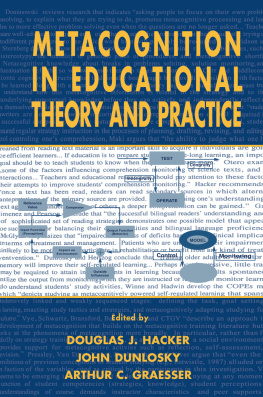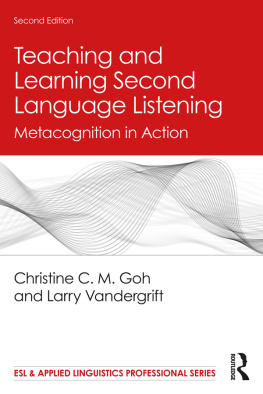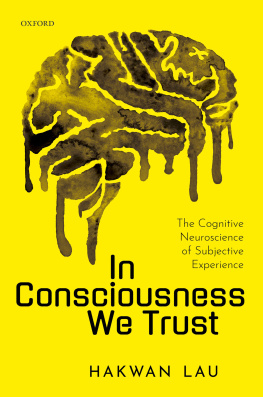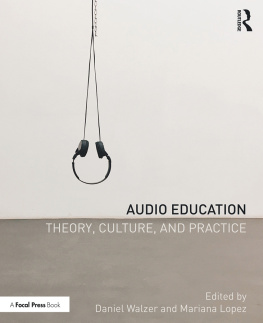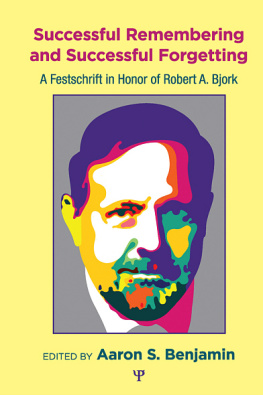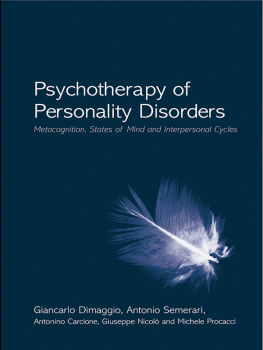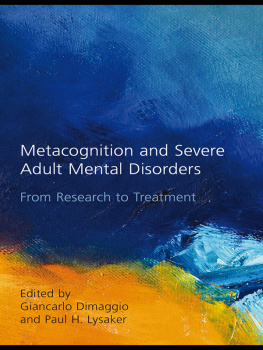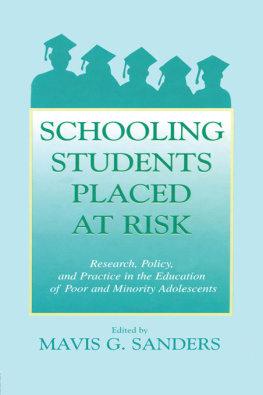
Metacognition
in
Educational Theory and Practice

The Educational Psychology Series
Robert J. Sternberg, Series Editor
Marton/BoothLearning and Awareness
Hacker/Dunlosky/GraesserMetacognition in Educational Theory and Practice
Smith/PourchotAdult Learning and Development: Perspectives From Educational Psychology
Metacognition
in
Educational Theory and Practice

Edited by
Douglas J. Hacker
The University of Memphis
John Dunlosky
University of North Carolina at Greensboro
Arthur C. Graesser
The University of Memphis

First Published by
Lawrence Erlbaum Associates, Inc., Publishers
10 Industrial Avenue
Mahwah, New Jersey 07430
Transferred to Digital Printing 2009 by Routledge
270 Madison Ave, New York NY 10016
2 Park Square, Milton Park, Abingdon, Oxon, OX14 4RN
Copyright 1998 by Lawrence Erlbaum Associates, Inc.
All rights reserved. No part of this book may be reproduced in any form, by photostat, microfilm, retrieval system, or any other means, without the prior written permission of the publisher.
Cover Design by Kathryn Houghtaling Lacey and John Dunlosky
Cover figures taken from the following sources:
Carver, C. S., & Scheier, M. F. (1990). Origins and functions of positive and negative affect: A control-process view. Psychological Review, 97, 1935. Copyright 1990 held by the American Psychological Association. Adaptation printed with permission by Carver.
Miller, G. A., Galanter, E., & Pribram, K. H. (1960). Plans and the structure of behavior. New York: Holt, Rinehart & Winston.
Nelson, T. O., & Narens, L. (1994). Why investigate metacognition? In J. Metcalfe & A. P. Shimamura (Eds.), Metacognition: Knowing about knowing (pp. 125). Cambridge, MA: MIT Press.
Library of Congress Cataloging-in-Publication Data
Metacognition in education theory and practice / edited by Douglas J. Hacker, John Dunlosky, Arthur C. Graesser.
p. cm.
Includes bibliographical references and indexes.
ISBN 0-8058-2481-2 (Cloth : alk. paper). ISBN 0-8058-2482-0
(pbk. : alk. Paper)
1. Cognitive learningUnited States. 2. Metacognition.
I. Hacker, Douglas J. II. Dunlosky, John. III. Graesser,
Arthur C.
LB1067.M425 1998
370.152dc21
9738586
CIP
Publishers Note
The publisher has gone to great lengths to ensure the quality of this reprint but points out that some imperfections in the original may be apparent.
To Margaret F. Hacker, nee LaFond,
Paul Turnitza,
and Roy K. Graesser
Contents
| Thomas O. Nelson |
| Douglas J. Hacker |
| Roger L. Dominowski |
| Janet E. Davidson and Robert J. Sternberg |
| Martha Carr and Barry Biddlecomb |
| Barbara M. Sitko |
| Ruth H. Maki |
| Jos Otero |
| Douglas J. Hacker |
| Georgia Earnest Garca, Robert T. Jimnez, and P. David Pearson |
| Susan M. McGlynn |
| John Dunlosky and Christopher Hertzog |
| Philip H. Winne and Allyson F. Hadwin |
| Nancy J. Vye, Daniel L. Schwartz, John D. Bransford, Brigid J. Barron, Linda Zech, and The Cognition and Technology Group at Vanderbilt |
| Michael Pressley, Shawn Van Etten, Linda Yokoi, Geoffrey Freebern, and Peggy Van Meter |
| John Dunlosky |
Metacognitive Food for Thought in Educational Theory and Practice
Thomas O. Nelson
University of Maryland
This book describes the broad domain of research on metacognitive aspects of education. In contrast to earlier books, such as J. R. Kirbys Cognitive Strategies and Educational Performance (1984, Academic Press) in which the ideas about metacognition are sprinkled throughout the book without systematic attempts to integrate those ideas into coherent wholes, the present book does try to give coherence to ideas about metacognition. What are the slices in the metaphorical pie of metacognitive aspects of education, and how should the pie be cut up so that each piece can stand on its own as well as contribute in a useful way to the overall whole?
In this book, we see the beginning of some answers to those questions. The authors of each chapter were assigned the task of reviewing the current literature, discussing the theoretical implications, suggesting the educational implications, and making suggestions for future research.
How did we get to this point, where sufficient interest in metacognition has arisen to warrant a book on the status of current research on the metacognitive aspects of education? Although metacognition had its roots in research conducted prior to the 1970s, the pioneering research on metacognition per se occurred in the 1970s, primarily in developmental psychology. This pioneering research focused on global demonstrations of interesting phenomena, and even at that time, the potential applications to education could be anticipated. However, the methodology of the early research was not highly sophisticated, and rigorous theories were not available. Nevertheless, it was obvious that people who, for instance, were in self-paced learning tasks would distribute their study time in ways that were not haphazard and that varied systematically across different kinds of learners. However, because the research program was not yet analytic, researchers did not have much understanding about the specific metacognitive mechanisms that gave rise to those differences in study times.
Then in the 1980s and 1990s, researchers in cognitive psychology joined the researchers in developmental psychology and educational psychology to produce more sophisticated methodologies for assessing metacognition. Theoretical frameworks also were developed in the early 1990s that helped to suggest ways in which various metacognitive activities could be analyzed (e.g., differences in self-paced study times could be due either to differences in the monitoring of what was being learned or to differences in the control of self-paced study time, or both). One of the main kinds of metacognitive monitoring that received attention from researchers during the 1980s and early 1990s was the feeling of knowing, which pertains to peoples predictions of what they know when they cannot recall an item from memory. Although the feeling of knowing is interesting for theoretical reasons (e.g., how can a system know that it knows an item without being able to recall the item?), the feeling of knowing is only of limited use in applied situations such as the learning of new information. Fortunately, however, increased interest began in the 1990s on the topic of how people monitor their ongoing learning, and this research focused on judgments of learning. Questions were investigated both about the bases for peoples judgments of learning and about the accuracy of peoples judgments of learning, and overall frameworks began to integrate the judgments of learning (the monitoring component) with various control components (e.g., allocation of self-paced study time, choice of strategies for encoding the to-be-learned items).
Next page
